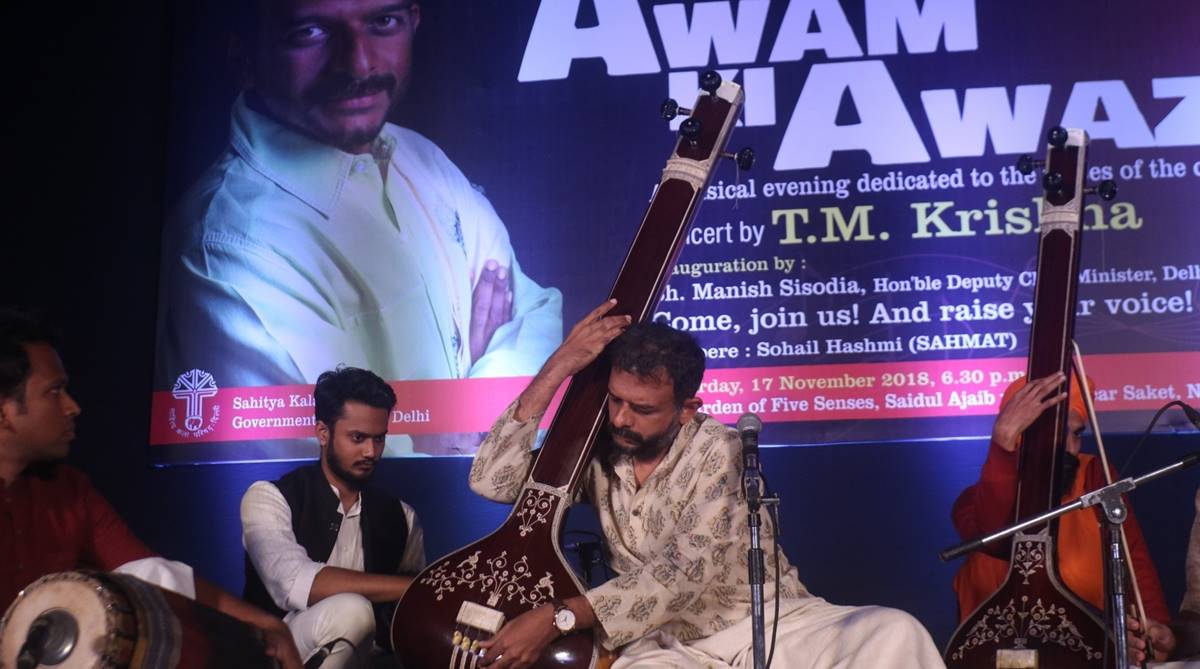After three days of uncertainty, Carnatic singer TM Krishna kept his date with Delhi on 17 November. The Capital showered all its love on the artist as hundreds converged at Garden of Five Senses in South Delhi’s Saket, which was the venue for “Awam ki Awaz” where Krishna had his concert.
The singer was scheduled to perform at a programme jointly organised by the Airports Authority of India (AAI) and cultural body SPIC-MACAY. His concert was to be part of a two-day “Dance and Music in the Park” festival to be held November 17 and 18 in Delhi’s Nehru Park at Chanakyapuri.
Advertisement
On November 10, the AAI even extended invitation to people via its Twitter handle. But all hell broke loose after that, and the AAI, as also the singer, was subjected to heavy right-wing trolling. Krishna’s Carnatic compositions on Jesus Christ and Allah don’t do down well with a section of people, and the singer faces a lot of criticism on this account. The trolling saw a new high after AAI’s tweet, which Krishna had re-tweeted.
On November 14, the AAI posted another tweet announcing that they were “postponing” the event due to “urgent engagements”.
READ | Delhi government reaches out to singer TM Krishna with offer to host concert
While trolls had welcomed the decision, many music lovers were upset too.
On 15 November, the Aam Aadmi Party government stepped in, offering to host the singer, and finalised the date, time and venue by the next day.
Krishna did not say much at the event where he performed on Saturday, but speaking to Thestatesman.com after landing in Delhi earlier in the day, he said he was very happy that he would be singing in Delhi at a “public space”.
“Public space is the soul of this country and we all need to recapture the public space and share it with everybody,” he said.
When asked what he planned to sing at the event, he said he wasn’t sure of that yet but it would be to “celebrate” India’s pluralism.
READ | Airports Authority of India calls off TM Krishna concert in Delhi after trolls kick up a row
“The spirit of today has transformed in last three days. I do believe it’s a celebration of multiple voices, it’s a celebration of democracy, it’s a celebration of the Indian Constitution, and it’s a celebration, truly, of the multi-religious, multi-cultural country that we are,” said the singer.
Krishna walked the talk at the event, as he performed compositions, including those on Kabir, Lord Krishna and Jesus Christ, in Kannada, Hindi and Malayalam.
Speaking to The Statesman, he also spoke about the inherent traits of Carnatic music, the connection of religion to music and what he felt about the trolling he faces for his music.
Classical music in India has for long seen an onslaught of Western or other influence, and the country has welcomed fusion, embraced multi-cultural ethos. So, why are Krishna’s compositions on Jesus and Allah inviting criticism?
“Fusion will never have any objection. Whether it’s a fusion with North Indian music or South Indian music, nobody will have an objection with it. The objections will always come for forms that the upper caste society of India thinks are pure. As far as South India goes, the upper caste society of South India believes Carnatic music by itself has a sense of purity. And entrenched in that sense of purity is the idea that it is upper caste Hindu music. Therefore, there are objections to this,” the singer replied.
He chose to add: “Having said that, let us not think that Hindustani (classical) music does not have its own subterranean belief of a certain kind of Hinduism as being its basis. Though I agree, in Khayal specifically, the lyrics are diverse, there is a general sense of Hindu spirituality that is the undertone of the Hindustani music. Irrespective of who the musician is, they always seem to talk in terms of the undertone of Hindu spirituality. Therefore, there it operates in a slightly more subtle manner. In South India, it operates in a more obvious manner. Because, the lyrics also, in Carnatic music, is primarily Hindu gods and goddesses.”
So, how does Krishna counter the protesting voices?
“I don’t respond to trolls. People who are dissenting against me, I believe it’s their democratic right… But if you believe that somebody who disagrees with you, somebody has a different view, or somebody who has a different political stance does not have right to express it or should be shut down in some fashion, I am sorry I don’t agree with you.”
Asked what would be his message to the people, Krishna said: “Let’s all come together, let’s all listen to music, make music, in the sense of happiness…and share love and affection”.
“This country needs more of love. This country needs more of affection. This country needs more of sharing. We have too much hate, too much violence, too much anger and too much shouting,” he concluded.









